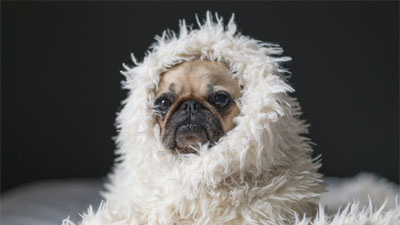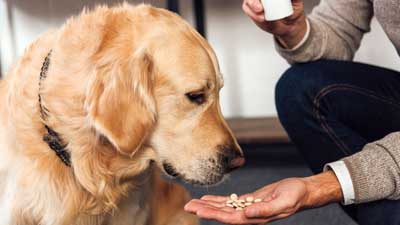- Size
- Smallest
- Small
- Small to Medium
- Medium
- Large
- Giant
- Characteristics
- Smartest
- Hypoallergenic
- Fluffy
- Best Guard
- Best Family
- Best for Kids
- Low Shedding
- Healthiest
- Police Dogs
- Most Calm
- Quietest
- Color
- White
- Black
- Grey
- Brown
- Blue
- Red
- Coat
- Hairless
- Short
- Long
- Origin
- Japan
- China
- Australia
- Germany
- Italy
- United States
- France
- Group
- Hound
- Terrier
- Herding
- Toy
- Working
- Sporting
10 Natural Remedies for Treating a Dog with a Cold

Photo by Robert Thiemann on Unsplash
Just like humans, our beloved canine companions can fall prey to the discomfort of a cold. While veterinary care is essential for severe cases, there are several natural remedies and supportive measures you can employ to alleviate your dog's cold symptoms and promote a speedier recovery.
In this comprehensive guide, we'll explore various natural treatments, lifestyle adjustments, and preventive measures to enhance your dog's well-being during a bout of the common cold.
Understanding Canine Colds
Before delving into natural remedies, it's crucial to recognize the signs of a cold in dogs. Typical symptoms include sneezing, coughing, nasal congestion, watery eyes, runny nose, lethargy, and a decrease in appetite. Once you've identified these signs, you can implement natural interventions to ease your furry friend's discomfort.
1. Maintain Optimal Hydration:
Adequate hydration is essential for your dog's recovery. Ensure a constant supply of fresh, clean water, and consider adding low-sodium chicken broth to entice them to drink more. Proper hydration supports overall health and helps soothe a sore throat.
2. Nutrient-Rich Diet:
Provide a balanced and nutrient-rich diet to bolster your dog's immune system. Incorporate foods rich in vitamins and minerals, such as lean meats, vegetables, and fruits. Special canine-friendly recipes or bone broth can be beneficial during this time.
3. Humidify the Air:
Using a humidifier in your dog's sleeping area helps ease nasal congestion and soothe irritated airways. Opt for a cool-mist humidifier to maintain a comfortable environment.
4. Herbal Supplements:
Certain herbs possess immune-boosting and anti-inflammatory properties. Echinacea, licorice root, and chamomile can be included in your dog's diet or administered as herbal teas. However, always consult with a veterinarian before introducing new supplements.
5. Raw Honey:
Raw, unprocessed honey is known for its antibacterial and soothing properties. Add a small amount to your dog's food or let them lick it off a spoon. Ensure the honey is free of additives and sourced from reliable producers.
6. Steam Therapy:
Create a steam tent by bringing your dog into the bathroom while you take a hot shower. The steam helps alleviate congestion and makes breathing more comfortable.
7. Nasal Irrigation:
Saline nasal drops or a saline solution can be used to clear your dog's nasal passages gently. Consult with your veterinarian to determine the appropriate dosage and method.
8. Rest and Comfort:
Just like humans, dogs need ample rest to recover from illness. Create a cozy and warm resting space for your pet and encourage relaxation.
9. Regular Exercise:
While strenuous exercise should be avoided during illness, gentle activities such as short walks can help improve circulation and maintain a healthy energy balance.
10. Massage and TLC:
Gentle massages can help alleviate muscle soreness and improve circulation. Provide your dog with extra love and attention to reduce stress and boost their spirits.
Preventive Measures for Future Wellness
Beyond treating a current cold, implementing preventive measures can enhance your dog's overall well-being and reduce the likelihood of future illnesses:
Balanced Nutrition: Maintain a well-balanced and species-appropriate diet to ensure your dog receives essential nutrients for optimal health.
Regular Veterinary Check-ups: Schedule regular check-ups to monitor your dog's health, address potential concerns early on, and stay up-to-date on vaccinations.
Clean Living Spaces: Regularly clean and sanitize your dog's living spaces, including bedding, toys, and food and water bowls, to minimize the risk of infections.
Hygiene Practices: Practice good hygiene by grooming your dog regularly, keeping their fur clean, and checking for any signs of discomfort or abnormalities.
Regular Exercise: Incorporate regular, moderate exercise into your dog's routine to promote cardiovascular health and overall well-being.
Conclusion
Caring for a dog with a cold involves a combination of natural remedies, supportive measures, and preventive strategies. By incorporating these holistic approaches into your dog's care routine, you not only alleviate their current symptoms but also contribute to their long-term health and happiness. Always consult with your veterinarian before introducing new treatments, ensuring the well-being of your cherished canine companion.
You May Also Like
 Dog HealthCan Humans Transmit Colds To Dogs?
Dog HealthCan Humans Transmit Colds To Dogs? Dog HealthDog Cold vs. Kennel Cough: What's the difference?
Dog HealthDog Cold vs. Kennel Cough: What's the difference? Dog HealthExploring Canine Cold Tolerance: How Low Can Dogs Go?
Dog HealthExploring Canine Cold Tolerance: How Low Can Dogs Go? Dog HealthHow Long Does It Take A Dog To Show Signs Of Parvo?
Dog HealthHow Long Does It Take A Dog To Show Signs Of Parvo? Dog HealthCan I Give Human Amoxicillin To My Dog?
Dog HealthCan I Give Human Amoxicillin To My Dog? Dog HealthWhat Happens If A Dog Eats Amoxicillin?
Dog HealthWhat Happens If A Dog Eats Amoxicillin?